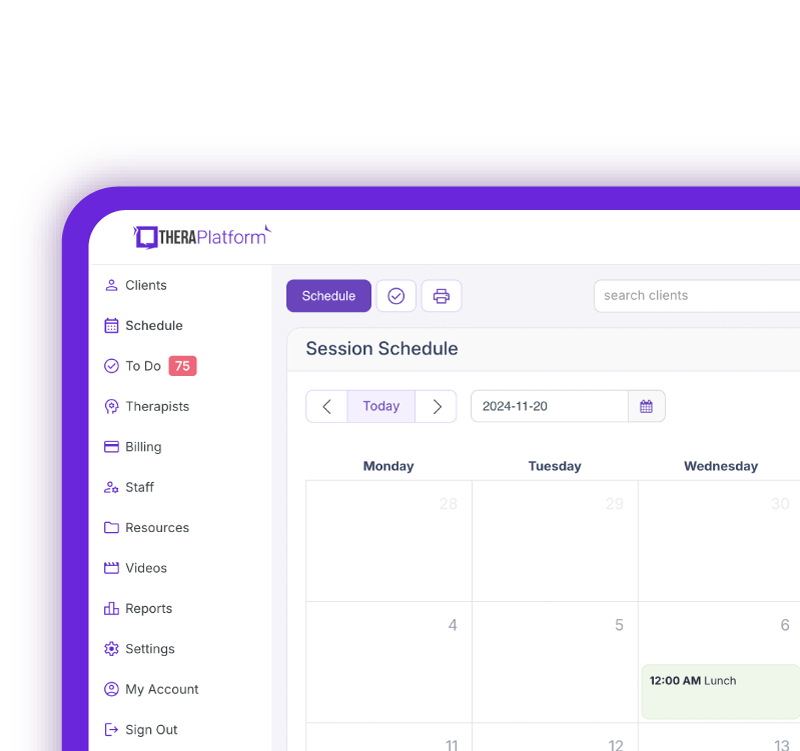CPT code 92526

CPT code 92526 is one of many codes used as part of a uniform coding system that allows for consistency of documentation for services among various medical professionals throughout the country. They consist of five specific digits which refer to a given diagnosis.
Summary
- CPT code 92526 is used by speech-language pathologists to bill for treatment of swallowing dysfunction and/or oral function for feeding and is not time-based—it can only be billed once per day. Enrolling in an insurance billing course for therapists can help providers enhance their knowledge.
- To ensure reimbursement, documentation must support medical necessity and show that treatment aligns with the dysphagia treatment plan, includes specific goals, and is distinct from any evaluations conducted on the same day.
- Common billing mistakes include using CPT 92526 for evaluations, billing it more than once per day, or failing to document non-e-stim techniques when electrical stimulation is used.
- By leveraging an EHR like TheraPlatform for efficient documentation and claim submission, therapists can tackle billing with ease.
→ Click here to enroll in our free on-demand Insurance Billing for Therapists video course [Enroll Now]
The codes are managed by the American Medical Association (AMA), and therapists attach them to documentation when billing therapy services. CPT stands for Current Procedural Terminology.
When billing a therapy service for a client who has Medicare and Medicaid, therapists are required to attach the appropriate CPT code to their documentation, such as the treatment note or evaluation report. Many private insurance companies require the use of CPT codes also.
As an SLP, it’s important to be familiar with some of the most commonly used CPT codes within your scope of practice. This can make documentation and billing more efficient.
Streamline your insurance billing with One EHR
- Claim batching
- Auto claims
- Automated EOB & ERA
- Real-time claim validation
- Real-time claim tracking
- Aging and other reports

Therapists can refer to the Centers for Medicare & Medicaid Services (CMS) website for a list of current CPT codes. Here’s an in depth description of one of the most important CPT codes for Speech Therapists to know: CPT code 92526 Treatment of Swallowing Dysfunction and/or Function for Feeding.
Who can bill this code, what services does it include, and when should SLPs use the code? We’ll take a look at all of that, as well as how to bill CPT 92526 correctly to ensure reimbursement and the best ways to stay current on updates to the code.
What is CPT code 92526?
The CPT code 92526 description is Treatment of swallowing dysfunction and/or oral function for feeding. It should be used by speech therapists when billing an individual treatment session for feeding therapy.
The session should be focused on addressing treatment goals that target skills which have been outlined in the dysphagia treatment plan, according to the American Speech Language Hearing Association (ASHA)
Speech-language pathologists can bill the CPT code 92526. This code is not time-based, and may only be billed once per day.
It can be difficult for SLPs to identify the most appropriate code for billing services at times. ASHA states clinicians should strive to use the “best” code to describe the services they provide.
Here are some examples of treatment sessions in which the provider can attach CPT code 92526 to documentation and billing:
- Working on improving oral function with an adult client with weakness of oral musculature, which is causing them difficulty chewing foods.
- Addressing a pediatric client’s oral Dysphagia by presenting a honey bear cup or straw for drinking.
- Modifying a client’s liquids (for example, thickening) due to his or her swallowing difficulties.
- Modifying the flow or type of nipple used for a baby who is showing signs of Dysphagia while drinking from a bottle (such as coughing).
Watch this video to learn common insurance billing struggles and solutions
→ Start My Free Trial
→ Start My Free Trial
How to use CPT code 92526
CPT codes can be separated into 2 categories: timed and service-based.
CPT code 92526 is a service-based code. Because it is not timed, the code is intended to be used for a specific procedure that matches its description. The length of the treatment session does not affect the billing of this code.
Follow these steps to correctly bill for the CPT code 92526:
- Refer to the AMA CPT manual to ensure CPT code 92526 is the best, most appropriate code for you to use for a specific session.
- Complete documentation for a treatment session (for example, in the form of a SOAP note).
- Attach the CPT code 92526.
- SLPs also have the option to complete a superbill and submit this directly to the payor (ex: Medicaid, Medicare, or private insurance) or to the client.
- Automated billing can also be used. This easy and efficient way of billing with the CPT code 92526 is offered by TheraPlatform.
The SLP’s documentation for the treatment session should reflect that the client has a treatment diagnosis related to the description of the CPT code 92526 . The goals targeted within the session should also relate to the areas outlined in this code’s description.
Here’s how to avoid some common errors when using the CPT code 92526, and reduce the likeliness of a reimbursement denial:
- Use the code for treatment, not evaluation.
- Do not bill using the CPT code 92526 more than one time in a day.
- The session can include e-stim (electrical stimulation). However, non-e-stim treatment must also be used and documented in order to bill under 92526.
- This code can be used on the same day that a Dysphagia evaluation was completed and billed. However, documentation must show that these were distinct and separate services. There must also be an established Plan of Care, and the treatment session in which the SLP bills the CPT code 92526 must address the goals outlined in the plan of care.
Practice Management + EHR + Telehealth
Mange more in less time in your practice with TheraPlatform

Reimbursement for CPT code 92526
ASHA’s Medicare Fee Schedule for Speech-Language Pathologists is a helpful source that can guide SLPs on which CPT code to use and current reimbursement rates.
The national fee for 2023 for the CPT code 92526 is $83.64.
Reimbursement rates of private insurance payers vary according to specific plans. Determining whether the client’s insurance plan covers speech therapy (including sessions in which the CPT code 92526 is billed) for their specific diagnosis is important. Verify this, and encourage your client to do so as well, prior to initiating services to maximize reimbursement for this code.
Some private providers who do not accept insurance choose to set their prices for services similar to Medicare or Medicaid reimbursement rates.
Coding changes
Updates to CPT codes are performed periodically, and it’s important for clinicians to stay current on changes that may affect the way they bill for services.
2023 changes affecting CPT code 92526
- CMS reported in a January 2023 update on Medicaid coding that: The HCPCS code G0283 (Electrical stimulation (unattended)) to one or more areas for indication(s) other than wound care, as part of a therapy plan of care shall not be reported with CPT code 92526 for electrical stimulation during the procedure.
Failure to comply with current requirements or not using the most appropriate CPT code can result in insurance denials or delayed reimbursement for services.
Stay up to date with changes to the CPT code 92526 by checking the AMA’s CPT codebook when updates are made. The AMA updates CPT codes annually and are effective for use on January 1st of each year.
The 92526 CPT code is one of the most important codes for Speech Language Pathologists who work with children and adults with feeding disorders to be familiar with. By staying current on what types of treatment the code includes and when to use it, providers can have more assurance that they’re following AMA guidelines and will receive reimbursement for services.
Practice Management + EHR + Telehealth
Mange more in less time in your practice with TheraPlatform

How EHR and practice management software can save speech-language pathologists time on insurance billing
EHR with integrated billing software and a clearing house, such as TheraPlatform, offers significant advantages to speech-language pathologists in creating an efficient insurance billing process. The key is minimizing the amount of time dedicated to developing, sending, and tracking medical claims through features such as automation and batching.
What are automation and batching?
- Automation refers to setting up software to perform tasks with limited human interaction.
- Batching or performing administrative tasks in blocks of time at once allows you to perform a task from a single entry point with less clicking.
Which billing and medical claim tasks can be automated and batched through billing software?
- Invoices: Create multiple invoices for multiple clients with a click or two of a button or set up auto-invoice creation, and the software will automatically create invoices for you at the preferred time. You can even have the system automatically send invoices to your clients.
- Credit card processing: Charge multiple clients with a click of a button or set up auto credit card billing, and the billing software will automatically charge the card (easier than swiping!)
- Email payment reminders: Never manually send another reminder email for payment again, or skip this altogether by enabling auto credit card charges.
- Automated claim creation and submission: Batch multiple claims with one button click or turn auto claim creation and submission on.
- Live claim validation: The system reviews each claim to catch any human errors before submission, saving you time and reducing rejected claims.
- Automated payment posting: Streamline posting procedures for paid medical claims with ERA. When insurance offers ERA, all their payments will post automatically on TheraPlatform's EHR.
- Tracking: Track payment and profits, including aging invoices, overdue invoices, transactions, billed services, service providers.
Utilizing billing software integrated with an EHR and practice management software can make storing and sharing billing and insurance easy and save SLPs time when it comes to insurance billing for therapists.
Streamline your practice with One EHR
- Scheduling
- Flexible notes
- Template library
- Billing & payments
- Insurance claims
- Client portal
- Telehealth
- E-fax

Resources
TheraPlatform is an all-in-one EHR, practice management, and teletherapy software built for therapists to help them save time on admin tasks. It offers a 30-day risk-free trial with no credit card required and supports different industries and sizes of practices, including speech-language pathologists in group and solo practices.
More resources
- Therapy resources and worksheets
- Therapy private practice courses
- Ultimate teletherapy ebook
- The Ultimate Insurance Billing Guide for Therapists
- The Ultimate Guide to Starting a Private Therapy Practice
- Mental health credentialing
- Insurance billing 101
- Practice management tools
- Behavioral Health tools
Free video classes
- Free on-demand insurance billing for therapist course
- Free mini video lessons to enhance your private practice
- 9 Admin tasks to automate in your private practice



